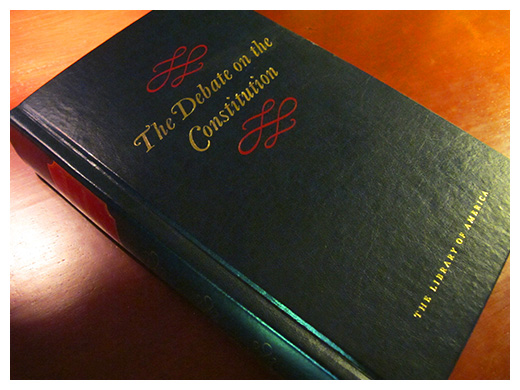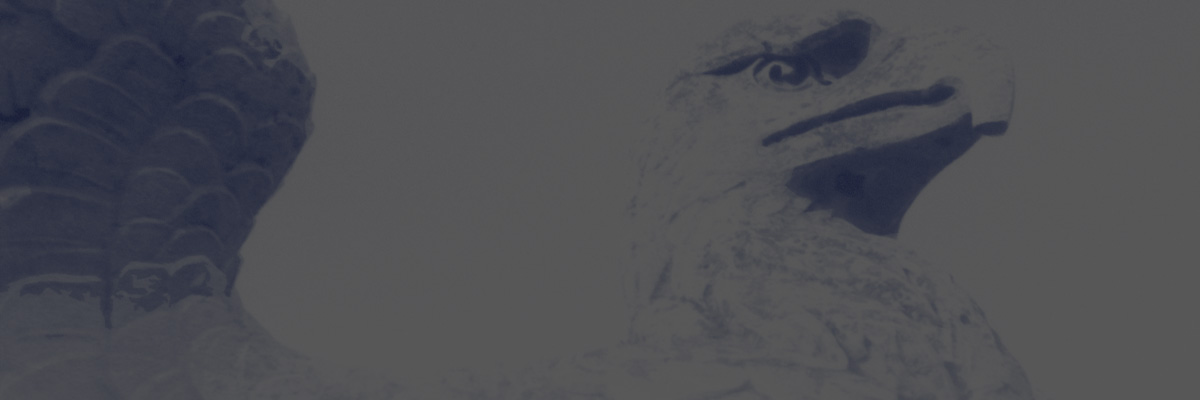Dave Buckhout .
Publication Date: January 2012
 This two-volume Library of America set covers the fervent, intellectual and emotional ratification debates in both the press and state Constitutional Conventions of 1787-1788. It is a feat of a collection, digging deep into the functional beginning of the United States. Almost 2000 pgs worth of letters, articles, and speeches—meticulously edited by Bernard Bailyn—make it a challenging, yet rewarding reading ‘project’ (and it is nothing short …). You are immediately struck by subjects & concerns that sound awfully familiar: size & role of gov’t, distribution of taxation, balance of public & private powers, drawing the line between individual liberty & fed’l infringement, even the debt. What is also familiar is the jousting of individuals w/strong ideals & egos. It is pointed, direct, often unsparing. But then you are reminded (if only through use of language & spelling alone) this is the 1780s, not now. Here is our democracy in uncharted waters. The immediacy and risk is palpable, as you realize no one in this debate knows how it is going to turn out. What a moment. As much as Americans claim to dislike barbed partisanship these days, it is easy to forget that to the point in history when this debate was occurring the usual alternative for competing factions had been bloody battle in the streets. There is plenty to dislike in modern-era partisanship; but layer in that historical context—which this collection does without ever having to say it—and you see clearly how this first great debate set the template: discussion, even heated arguments in which egos are bruised, ideals are bloodied, and the reality is: ‘you win some and you lose some,’ is still an astronomically superior societal plan than perpetual armed conflict, and-or aristocratic control. In this—our great original argument—a framework was established.
This two-volume Library of America set covers the fervent, intellectual and emotional ratification debates in both the press and state Constitutional Conventions of 1787-1788. It is a feat of a collection, digging deep into the functional beginning of the United States. Almost 2000 pgs worth of letters, articles, and speeches—meticulously edited by Bernard Bailyn—make it a challenging, yet rewarding reading ‘project’ (and it is nothing short …). You are immediately struck by subjects & concerns that sound awfully familiar: size & role of gov’t, distribution of taxation, balance of public & private powers, drawing the line between individual liberty & fed’l infringement, even the debt. What is also familiar is the jousting of individuals w/strong ideals & egos. It is pointed, direct, often unsparing. But then you are reminded (if only through use of language & spelling alone) this is the 1780s, not now. Here is our democracy in uncharted waters. The immediacy and risk is palpable, as you realize no one in this debate knows how it is going to turn out. What a moment. As much as Americans claim to dislike barbed partisanship these days, it is easy to forget that to the point in history when this debate was occurring the usual alternative for competing factions had been bloody battle in the streets. There is plenty to dislike in modern-era partisanship; but layer in that historical context—which this collection does without ever having to say it—and you see clearly how this first great debate set the template: discussion, even heated arguments in which egos are bruised, ideals are bloodied, and the reality is: ‘you win some and you lose some,’ is still an astronomically superior societal plan than perpetual armed conflict, and-or aristocratic control. In this—our great original argument—a framework was established.
In addition, you are constantly reminded that so much of this is groping in the dark. It was largely a precedent-less time, as are most of the debated points. It was a time of intense salesmanship (lots of “trust us on this people”) and intense paranoia (lots of “you cannot trust these people”). I was stunned that I came to see some views of those in steadfast opposition of the Constitution’s ratification, simply because they put up articulate historical examples for “why standing armies would degenerate into tools for the ambitious,” or (something that will resonate brightly in this can’t-trust-Washington-era) the regular cry of: “leaders given such broad powers-of-the-purse could never be trusted, ever!” And yet, ultimately, those who take on this reading ‘project’ have to marvel at the accomplishment of it all—in that our nascent republic would defy the historical record—and there were those brave enough to intellectualize it, promote it, defend it and take the chance that this thing would work.
In the margins of Part 1 of Vol I: “Debates in the Press and in Private Correspondence / Sept 17, 1787 – January 12, 1788,” I noted many superior quotes. Here is the first batch:
-
From “An American Citizen I” [Tench Coxe] … “In that country [Britain] the king is hereditary and may be an idiot, a knave, or a tyrant by nature, or ignorant from neglect of his education, yet cannot be removed, for ‘he can do no wrong.’ In America, as the president is to be one of the people at the end of his short term, so will he and his fellow citizens remember, that he was originally one of the people; and that he is created by their breath.”
-
From: “A Citizen of America” [Noah Webster] … “The power of entailing estates is more dangerous to liberty and republican government, than all the constitutions that can be written on paper, or even than a standing army.” (among many still topical subjects, this in reference to estate taxes and the danger of landed plutocrats, as opposed to perceived threats embedded in this ‘new’ Constitution)
-
From: “Thomas Jefferson to William Stephens Smith” … “And what country can preserve its liberties if their rulers are not warned from time to time that their people preserve the spirit of resistance?” (in fact, many argued for the Second Amendment as a way to ‘keep authority honest,’ something irrelevant today what with the mobilized force of police, national guard, and other local/homeland security forces)
-
From: “Resolution of the Inhabitants of Pittsburgh” … “we have no reason to expect anything better from any other body of men assembled in convention …” (frontier fatalism? or just ‘saying it like it is’ !?)
"The Debates on the Constitution" › Part 2 of 3
Part 2 highlighting the great Library of America’s “The Debate on the Constitution” set. Here is a second batch from the first part of Vol I: “Debates in the Press and in Private Correspondence / Sept 17, 1787 – January 12, 1788.”
-
From: “A Countryman II” [believed to be Roger Sherman] … “If you suffer any man to govern you who is not strongly interested in supporting your privileges, you will certainly lose them.” (a blunt reminder to a people unfamiliar w/the democratic discipline required to exercise and protect individual freedom: ‘vote! every election matters’)
-
From: “Brutus IV” … “It is not expected that a legislature will be found in any country that will not have some of its members, who will pursue their private ends and for which they will sacrifice the public good.” (this is one of the more fascinating traits that is seen everywhere in these debates: that these men were so honest in confronting the darker motivations of individuals; it was a nearly universal agreement: that we should not simply trust the ‘better nature’ of public officials to always shine through—a group-think that wisely accepted and anticipated corruptibility … [see next, as well])
-
From: “Americanus V” [John Stevens, Jr.] … “Can any man, who has a tolerable acquaintance of human nature, imagine that men would so eagerly engage in public affairs, from whence they can hope to derive no personal emolument, merely from the impulse of so exalted, so pure, so disinterested a passion as patriotism, or political virtue? No! it is ambition that constitutes the very life and soul of Republican Government.”
-
From: “A Landholder VII” [Oliver Ellsworth] … “A test in favor of any one denomination of christians would be to the last degree absurd in the U.S.” (though ‘diversity’ in those days often meant ‘what type of Christian are you?’ the debates are largely silent on any religious litmus test, except when denying it should have anything to do with elected office—this strong secular desire finding its inspiration in the catastrophic history state-sponsored religion had played in Europe through the Middle Ages)
"The Debates on the Constitution" › Part 3 of 3
Part 3 highlighting the great Library of America’s “The Debate on the Constitution” set, here is a final batch of great quotes from the first part of Vol I: “Debates in the Press and in Private Correspondence / Sept 17, 1787 – January 12, 1788.”
-
From: “Reply to Pennsylvania Minority” [Noah Webster] … “The very attempt to establish a permanent, unalterable Constitution, is an act of consummate arrogance. It is a presumption that we have all possible wisdom—that we can foresee all possible circumstances—and judge for future generations, better than they can for themselves.” (‘originalism’ v. ‘organic’ = an old argument)
-
From: “A Cumberland County Mutual Improvement Society” … “the names of the majority [who voted for ratification], and their ignorant tools will be spurned and execrated by the succeeding generations as the pillars of slavery, tyranny and despotism.” (though in the minority, many thought this new Constitution an eventual tool for despots in-the-wings)
-
From: “The Genuine Information” [Luther Martin] … “slavery is inconsistent with the genius of republicanism, and has a tendency to destroy those principles on which it is supported, as it lessens the sense of the equal rights of mankind, and habituates us to tyranny and oppression.” (again, this is written in 1787)
-
From: “Centinel VIII” [Samuel Bryan] … “It was not the mere amount of the duty on stamps, or tea that Americans opposed, they were considered as signals of approaching despotism.”
-
From: “Americanus VI” [John Stevens, Jr.] … “Let us be thankful to an all-ruling Providence, which has enabled us to discover the clue by which we may finally extricate ourselves from that labyrinth of profound darkness and perplexity in which mankind have hither to wandered, with only now and then a glimmering of light.”
SOURCE : Bailyn, Bernard, ed. The Debate on the Constitution (Volume 1). New York: The Library of America, 1993.
